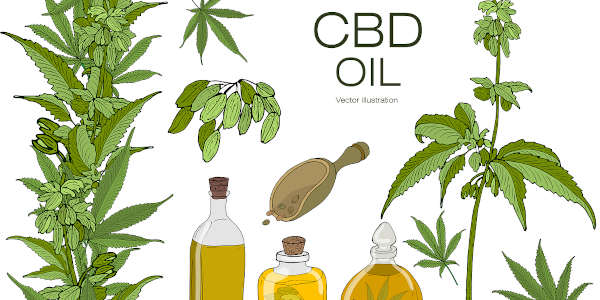Because CBD comes from the cannabis plant, most people think of cravings first when talking about the connection between this cannabinoid and appetite.
Experience reports on the effects of CBD on appetite vary, so it is unclear what exactly is going on in this context.
In this article, we will examine whether CBD acts as an appetite suppressant or suppressant, or whether we are dealing with a more complex issue.
THC vs CBD
The cannabis plant contains over 400 different active ingredients, of which several dozen are cannabinoids.
The two best-known cannabinoids are THC and CBD.
The former is the substance responsible for the intoxicating effects of marijuana, whereby THC mediates its effects by binding directly to CB1 receptors in the brain and the rest of the body.
In contrast, CBD is a non-intoxicating compound that has little affinity for CB1 and CB2 receptors.
Instead, CBD works by activating over 60 different molecular pathways, which gives it the potential to trigger very different effects.
THC affects appetite when binding to CB1 receptor
The appetizing effect that we associate with cannabis is caused by THC.
While we still don’t quite understand exactly why it induces hunger, research suggests that when THC binds to CB1 receptor it increases the production of ghrelin (a hormone that pushes us to eat).
CBD might have a different effect on appetite
Since CBD does not bind to CB1 receptors, it does not have the same appetizing effect.
However, it can affect our appetite indirectly.
The endocannabinoid system and hunger
The endocannabinoid system is a complex regulatory system that mediates a variety of physiological processes, including those related to appetite, nausea and metabolism.
We have limited understanding of the endocannabinoid system. THC was not discovered until the 1940s, and it was only years later that the researchers found out that humans actually make their own cannabinoids or have an endocannabinoid system.
We now know that activating CB1 receptors increases feelings of hunger, while blocking these receptors can reduce appetite.
We also know that the endocannabinoid system affects the body by signaling from neurotransmitters (such as dopamine) and can affect our reward system and craving for food.
Does CBD stimulate or inhibit appetite?
Research shows that CBD can affect neurotransmitters like serotonin, which also play an important role in regulating appetite and nausea.
In 2012, the British Journal of Pharmacology published a study that looked at the effects of CBD on nausea and appetite.
The study was conducted in laboratory rats and shrews, who were given various compounds such as nicotine, lithium chloride and cisplatin to induce nausea and vomiting.
After these animals were given CBD, the results showed that the symptoms of nausea and vomiting were reduced.
In order to better understand this effect, the researchers gave the animals an active ingredient that blocks the serotonin receptors in the dorsal raphe nucleus. It is a part of the brain stem that plays an important role in dealing with nausea and vomiting. Blocking these receptors reversed the effects of CBD, suggesting that CBD affects nausea and vomiting by activating these serotonin receptors.
Another study published a year later in the same journal, showed that CBDA, the acid precursor to CBD, has similar effects, but has an even higher affinity for serotonin receptors. Research, therefore, suggests that CBD and CBDA can indirectly increase appetite by reducing nausea.
However, other research suggests that CBD may also act as an appetite suppressant; for example by blocking CB1 receptors.
A study published in the journal Psychopharmacology in 2012 examined the effects of CBD on the eating behavior of rats. The study found that the compound greatly reduced the amount of feed consumed by animals, whereas CBN (cannabinol) increased food intake.
Research also suggests that CBD can help soothe inflammation-related problems throughout the gastrointestinal tract.
A 2011 study published in PLOS One found that this cannabinoid can reduce intestinal inflammation. Other studies have shown that CBD triggers these effects by activating TPRV (or vanilloid) receptors in the gastrointestinal tract. These receptors play a very central role in inflammatory processes and in pain signaling, which in turn are also related to appetite.
The question is still open on whether CBD increase or supress appetite
CBD is a very complex compound and the endocannabinoid system is just as complex.
Unfortunately, our understanding of both is still in its infancy.
However, what we do know is that, unlike THC, CBD does not bind to CB1 receptors, which means that it does not cause hunger or “munchies” in the same way as THC. However, research suggests that CBD can affect appetite, but it does so in a much more indirect way, including relief from nausea, inflammation, and other disorders.
On the other hand, there are some research results that suggest that CBD can act as an appetite suppressant.
For the time being, it should be noted that our relationship with our food has both emotional and physical aspects and that CBD can affect appetite differently in every person.



